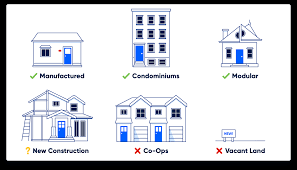The Various Types of Real Estate Property
Real estate is a diverse and dynamic industry that encompasses a wide range of property types, each with its unique characteristics and investment potential. Understanding the different types of real estate properties can help individuals make informed decisions when buying, selling, or investing in the real estate market.
Residential Real Estate
Residential real estate includes properties designed for people to live in, such as single-family homes, condominiums, townhouses, and apartments. These properties are typically used as primary residences or rental units and are often considered stable long-term investments.
Commercial Real Estate
Commercial real estate refers to properties used for business purposes, such as office buildings, retail spaces, hotels, and industrial facilities. Investing in commercial real estate can offer higher income potential but may also come with higher risks due to market fluctuations and economic conditions.
Industrial Real Estate
Industrial real estate comprises properties used for manufacturing, production, storage, and distribution activities. Warehouses, factories, distribution centers, and industrial parks fall under this category. Industrial real estate investments can provide steady cash flow and long-term appreciation potential.
Retail Real Estate
Retail real estate includes properties where businesses sell goods or services directly to consumers. Shopping centers, malls, standalone retail stores, and restaurants are examples of retail properties. Retail real estate investments are influenced by consumer spending trends and economic conditions.
Mixed-Use Real Estate
Mixed-use developments combine residential, commercial, and sometimes industrial elements within a single property or complex. These projects aim to create vibrant communities where people can live, work, shop, and socialize in close proximity. Mixed-use real estate offers diversification benefits for investors.
Vacant Land
Vacant land refers to undeveloped or unimproved parcels of land that have the potential for future development or use. Investors may purchase vacant land for various purposes such as residential construction, commercial development, agriculture, or conservation efforts.
In conclusion, the world of real estate offers a multitude of property types catering to different needs and investment goals. Whether you are looking for a place to call home or seeking opportunities to grow your wealth through real estate investments, understanding the various types of properties available can empower you to make informed decisions in this ever-evolving market.
Exploring Property Types: A Guide to Understanding Residential, Commercial, Industrial, Retail, Vacant Land, and Mixed-Use Real Estate
- Residential Property
- Commercial Property
- Industrial Property
- Retail Property
- Vacant Land
- Mixed-Use Property
Residential Property
Residential property refers to real estate designed for people to live in, including single-family homes, condominiums, townhouses, and apartments. These properties serve as primary residences for individuals and families or as rental units for tenants. Residential real estate is often seen as a stable long-term investment, providing homeowners with a sense of security and renters with a place to call home. The residential property market is influenced by factors such as location, housing demand, and economic conditions, making it a crucial sector within the broader real estate industry.
Commercial Property
Commercial property refers to real estate used for business purposes, such as office buildings, retail spaces, hotels, and industrial facilities. Investing in commercial property can offer attractive income potential through rental income from tenants. However, commercial real estate investments also come with risks related to market conditions and tenant turnover. Understanding the nuances of the commercial property market and conducting thorough due diligence are essential steps for investors looking to capitalize on the opportunities in this sector.
Industrial Property
Industrial property refers to real estate used for manufacturing, production, storage, and distribution activities. This category includes warehouses, factories, distribution centers, and industrial parks. Investing in industrial real estate can offer investors steady cash flow and long-term appreciation potential. Industrial properties are essential components of the supply chain infrastructure and play a crucial role in supporting various industries. With the increasing demand for logistics and e-commerce facilities, industrial property has become an attractive investment option with opportunities for growth and diversification in the real estate market.
Retail Property
Retail property refers to real estate assets that are specifically designed and utilized for businesses selling goods or services directly to consumers. This category includes shopping centers, malls, standalone retail stores, and restaurants. Retail properties are highly influenced by consumer behavior, economic trends, and location factors. Investing in retail real estate can offer opportunities for steady income streams and capital appreciation, but it also requires careful consideration of market dynamics and tenant mix to ensure long-term success in this competitive sector of the real estate market.
Vacant Land
Vacant land refers to undeveloped or unimproved parcels of land that hold immense potential for future development or use. Investors often see vacant land as a blank canvas, offering endless possibilities for residential construction, commercial development, agricultural ventures, or conservation efforts. While vacant land may not generate immediate income like other real estate properties, it can serve as a strategic long-term investment with the promise of significant returns once developed or sold. Understanding the unique opportunities and challenges associated with vacant land can help investors make informed decisions in leveraging its value within the dynamic real estate market.
Mixed-Use Property
Mixed-use property refers to a versatile real estate concept that combines different types of residential, commercial, and sometimes industrial elements within a single development. These properties are designed to create vibrant and integrated communities where residents can live, work, shop, and socialize in one convenient location. Mixed-use properties offer numerous benefits, including increased walkability, reduced commute times, and a more sustainable use of land. Investors in mixed-use properties can enjoy diversification in their portfolios and capitalize on the growing demand for mixed-use developments in urban and suburban areas.
Tags: cash flow, commercial real estate, distribution activities, distribution centers, factories, hotels, industrial facilities, industrial parks, industrial real estate, investment potential, long-term appreciation potential, manufacturing, mixed-use real estate, office buildings, primary residences, production, property types, real estate, rental units, residential real estate, retail real estate, retail spaces, storage, types of real estate property, vacant land, warehouses
